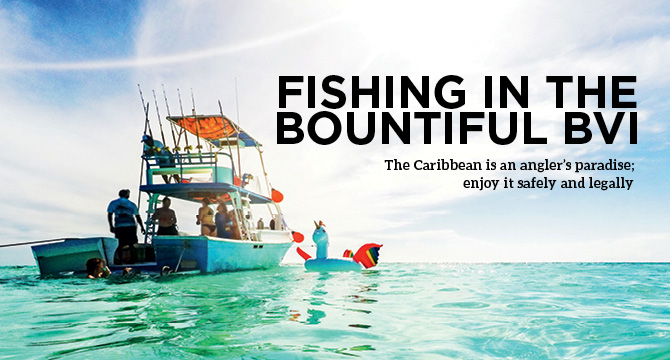When vacationers arrive in the islands, many come with their hopes set on relaxing by the beach, dining on their own catch reeled in during a fun day on the water. Mahi, tuna, wahoo, and other edible fish are plentiful in the deeper waters off the Caribbean islands, creating a mecca for eager fishermen from around the world. But what many people don’t realize is that local laws, if not taken into account, can put a damper on your fishing experience.
Happily, fishing is permitted in the British Virgin Islands, as long as enthusiastic fishermen (and fisherwomen!) follow the local laws and obtain the correct permits. If you plan to fish in the British Virgin Islands, you’ll need a temporary pleasure fishing license for each eager angler 18-years of age and older. The process is easy – simply fill out the application (which can be found on the BVI government website) and then submit it either in person or by e-mail along with a photo ID and a 45.00 fee. The license is valid for 30 days. Sometimes, your yacht crew or trusted charter broker will even initiate this process for you! You’ll want to keep in mind that some species of fish living near the reef are harmful for human consumption and must be thrown back into the sea if caught due to a toxin called ciguatera which renders the fish inedible. Catching and releasing fish has the potential to injure or even kill them, so we’d encourage you to eschew fishing near the reef in favour of chartering a local fishing charter boat. In deeper waters, you’ll be able to fish for pelagic, or edible, fish, such as Mahi, tuna, and wahoo. These types of fish have a 30 lb bag limit, and persons with pleasure fishing licences are not permitted to sell their catch. But no worries! That law simply translates to more delectable meals for you!
If you’re thinking of breaking the rules and passing on procuring a fishing license before casting your reel, think again. The British Virgin Islands levy steep penalties on those who are caught fishing illegally. Offenders may also have fishing equipment confiscated, could have their vessel seized, or could even go to jail! All in all, cheating the system is simply not worth the risk. Obtain your official fishing license and relax knowing that you’re free to while away the hours with your rod and reel – legally.
Commercial fishing also exists in the British Virgin Islands, and like pleasure and sports fishing, requires the appropriate permit. Some species are only available for commercial fishing. Lobster, for example, is entirely illegal to catch in the British Virgin Islands unless you happen to be a commercial fishing vessel. For commercial fishermen, open season on lobster lasts from November 1 to July 30. And while you may not be able to catch and eat your own lobster in the British Virgin Islands, you can certainly indulge at any number of the local seafood restaurants that will happily serve you lobster prepared just to your taste right on the beach!
You’ll want to keep in mind that not all areas of the British Virgin Islands are open for fishing, even with a fishing license. While certain priority areas of the BVI’s are available for leisure fishing, other areas are considered “Marine Protected Areas” where fishing is strictly prohibited. To find a list of Marine Protected Areas, you can visit the BVI Conservation and Fisheries department website. The goal of protected areas is to conserve local fish populations and to encourage them to reproduce without troublesome humans nearby! Because of this, all human activity, with the exception of snorkelling, is prohibited in these areas.
On the other hand, some areas of the BVI’s are considered priority areas for fishing. These include Great Harbour, The Bight, Frenchman’s Cay, Benures Bay, West Guana Island, and Great Camanoe. These areas are specifically designated for licensed vessels and individuals to fish. However, snorkelling, diving, and other recreational activities are not permitted in these areas. Like commercial lobster fishing, several other species of fish in the BVI’s have open and closed seasons. To make sure you are following the law, be sure to check the Conservation and Fisheries website for information on regulated species. Of course, the removal of Leatherback sea turtles, Loggerhead turtles, and Goliath grouper is strictly forbidden, no matter the season!
At the end of the day, fisherman or not, we all want what’s best for the beautiful Virgin Islands. Whether we live here or are simply visiting, we all want to protect the environment from harm so that we can enjoy the abundant beauty of the islands for many years to come! Fortunately, the British Virgin Islands are proactive in their approach, balancing enjoyment of nature’s bounty with local conservation efforts, meaning plenty of opportunities for fishing fun while still investing in a sustainable future.
[ts_fab]
